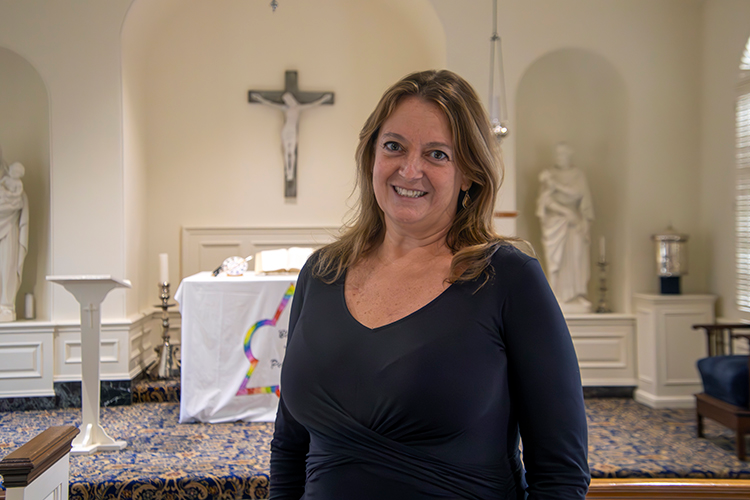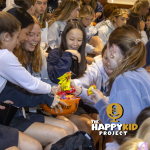Catherine McTamaney ’90: Teaching As An Act of Compassion
 In a recent assembly at Vanderbilt University, Catherine McTamaney ’90 received the prestigious Thomas Jefferson Award, given annually for distinguished service to Vanderbilt through extraordinary contributions as a member of the faculty. Several universities endow the award, and the University of Virginia first established it in honor of its founder. Vanderbilt has presented the award since 1967.
In a recent assembly at Vanderbilt University, Catherine McTamaney ’90 received the prestigious Thomas Jefferson Award, given annually for distinguished service to Vanderbilt through extraordinary contributions as a member of the faculty. Several universities endow the award, and the University of Virginia first established it in honor of its founder. Vanderbilt has presented the award since 1967.
The award presenters particularly praised McTamaney for her compassion, sound leadership, and fortitude. She has served the university in many roles during her 17-year tenure on the faculty. Most notably, she has been a member of the Faculty Senate since 2018, served as chair during the COVID-19 pandemic, and served in the critical leadership position as chair of the Faculty Senate Grievance Committee.
After a few minutes of conversation with McTamaney, though, one realizes that accolades and recognition for years of professional service are far from her principal motivators.
“In all of my scholarship and research, I write about teacher development and teaching as compassionate practice,” she explained. “It’s hard to be a teacher — especially with the struggles that are in front of schools right now. Teaching can be a lonely practice, but I think some of the best teachers feel a calling to the work. A lot of the work that I do, especially in the Montessori community and doing school consulting, is around issues of teacher spiritual development — do you know how to do your work in a way that sustains yourself and sustains other teachers as well?”
That reverence for the sanctity of teachers and the teaching profession is evident in everything McTamaney does. As Associate Professor of the Practice of Education and Director of Undergraduate Studies for the Department of Teaching and Learning at the Peabody College of Vanderbilt, she works primarily with undergraduates in Peabody’s teacher licensure programs, focusing on public education and the social and political context within which the educational system operates, integration of education and the arts, and practices of compassionate teaching.
She has dedicated countless hours to an expert blog that allows Montessori teachers to freely use her content in promoting the vision of Montessori methods as an international language. She has published several books on the intersection of teaching and other spiritual and meditative practices. She teaches face-to-face classes that focus on infant, toddler, and early childhood development, as well as the development and protection of ideas of wonder in young children, and even a class that deconstructs the Percy Jackson children’s book series exploring themes about how adolescent development can be a quest for exploring virtue and character.
McTamaney has described her books as written to allow for some reflection or meditation on areas in education.
“My books are more like educational philosophy texts,” she said. “They’re companion texts to teachers who might want to be able just to sit down and, even if they are not in community, be able to open the text up and see that there are other people out there who realize that this is tough work.”
She credits Oak Knoll as an incubator for her educational philosophy, a laboratory for her creative curiosities, and a showcase for women in leadership and learning. After attending Oak Knoll’s Lower School from grade 2 through middle school, she briefly followed her brothers into a coed middle school but quickly discovered that the social distractions were not for her. She returned to Oak Knoll for her Upper School education and flourished.
“Girls at all-girls’ schools perform academically stronger than any of our peers in other spaces, “ she explained. “I saw women in the highest positions of leadership at Oak Knoll. It wasn’t just that we had class presidents or leadership inside our class; there were women as Heads, on the Board of Trustees, and setting examples throughout my entire experience at Oak Knoll. I saw women in these complicated positions who could join the school community and create a loving, welcoming, inclusive environment daily.”
As for nurturing her curiosity, the school always supported an idea that originated from a thoughtful place. “At Oak Knoll, you can be curious about many different things. And as long as you keep asking interesting questions, the world will arise with some amazing adventures for you to have,” McTamaney related. “Oak Knoll was a place where you could pursue these nerdy curiosities, and that pursuit was almost prestigious.”
Oak Knoll created a space for McTamaney where she felt seen, understood, and safe to make mistakes. She seeks to create that same space for her students.
“The relationships are the most important thing in the classroom, and I have to create an environment where my students trust me enough to be vulnerable,” she said. “If they are uncomfortable, then they’re not going to learn from me because learning requires you to give up what you already know about the world to take on some new knowledge, and that doesn’t happen in a space that’s not emotionally responsive.”
“The American experiment is tied so closely to how we school children, and it shouldn’t be something we do by default,” she emphasized. “As a teacher or student, how do I change the world through my interactions with it? We should be thoughtful and intentional, and the smartest possible people in the country should be the teachers we bestow on elementary and secondary school classrooms.”
There is so much more about the well-rounded life and career of Catherine McTamaney ’90 than can be included here. Read more and access her blog through her website. Read about the exciting and groundbreaking project she helped to conceive while participating in the Social Computing Group at MIT, and marvel at the professional acting and directing work she has done in regional theater around Nashville.






